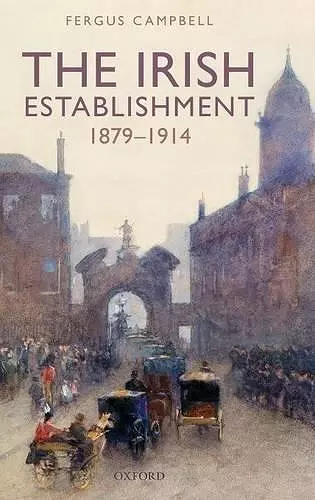The Irish Establishment 1879-1914
Format:Hardback
Publisher:Oxford University Press
Published:6th Aug '09
Currently unavailable, and unfortunately no date known when it will be back
This hardback is available in another edition too:
- Paperback£35.99(9780198866442)

The Irish Establishment examines who the most powerful men and women were in Ireland between the Land War and the beginning of the Great War, and considers how the composition of elite society changed during this period. Although enormous shifts in economic and political power were taking place at the middle levels of Irish society, Fergus Campbell demonstrates that the Irish establishment remained remarkably static and unchanged. The Irish landlord class and the Irish Protestant middle class (especially businessmen and professionals) retained critical positions of power, and the rising Catholic middle class was largely-although not entirely-excluded from this establishment elite. In particular, Campbell focuses on landlords, businessmen, religious leaders, politicians, police officers, and senior civil servants, and examines their collective biographies to explore the changing nature of each of these elite groups. The book provides an alternative analysis to that advanced in the existing literature on elite groups in Ireland. Many historians argue that the members of the rising Catholic middle class were becoming successfully integrated into the Irish establishment by the beginning of the twentieth century, and that the Irish revolution (1916-23) represented a perverse turn of events that undermined an otherwise happy and democratic polity. Campbell suggests, on the other hand, that the revolution was a direct result of structural inequality and ethnic discrimination that converted well-educated young Catholics from ambitious students into frustrated revolutionaries. Finally, Campbell suggests that it was the strange intermediate nature of Ireland's relationship with Britain under the Act of Union (1801-1922)-neither straightforward colony nor fully integrated part of the United Kingdom-that created the tensions that caused the Union to unravel long before Patrick Pearse pulled on his boots and marched down Sackville Street on Easter Monday in 1916.
A remarkably detailed and wide-ranging monograph on Ireland's social elite in the last four decades of the Union. * N. C. Fielding, 20th Century British History *
This groundbreaking study...bristles with provocative insights and conclusions... Campbell's book is a significant advance in the history of the last years of the Castle regime and the Irish establishment and will be required reading for students of the period. * Martin Maguire, Irish Journal. *
This is an excellent book, intelligently written and well worth reading * K. Theodore Hoppen, Journal of Ecclesiastical History *
a highly recommended study of outstanding scholarship which will be of interest to those interested in late nineteenth- and early twentieth-century Ireland. * Gerard Moran, History *
Campbell's research is altogether impressive and its results are clearly and eloquently presented: there is no question that he has produced an important study, which will remain a classic in its field. * Eugenio F. Biagini, English Historical Review *
notable contributions to understanding the decline and death of union in the late nineteenth and early twentieth centuries ... intricate and granular researches * Alvin Jackson, The Journal of Modern History *
ISBN: 9780199233229
Dimensions: 241mm x 163mm x 27mm
Weight: 704g
364 pages